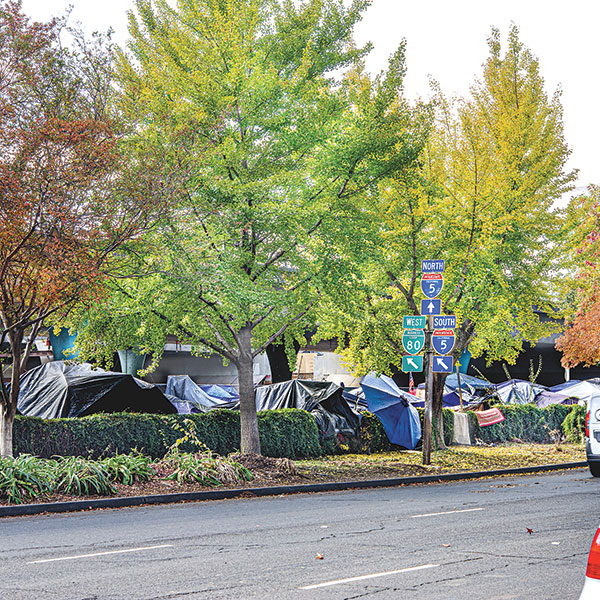The sights on lower X Street did it for me. Coming off the freeway, I saw wrecked cars and busted campers and people standing around, a pitiful procession pinned against the gutter like a forlorn carnival that took a wrong turn. Somebody stuck two orange traffic cones partway into the street, warning motorists to steer clear.
Lower X Street, home to warehouses and body shops, never delivered a welcoming hug to visitors who enter the city from river’s edge. Now it arrives with a punch in the face.

The people and dogs and vehicles and furniture and junk along lower X Street are not squatters surrounded by the detritus of homelessness and calamity. Strictly speaking, these people aren’t unsheltered. Their vehicles, with coaxing and a blast of Gumout, will run. The furniture and junk belong to someone.
Despite its appearance as a makeshift, decrepit urban campsite, the scene on lower X Street is officially sanctioned.
The broken vehicles and a tent city under the freeway along X Street are blessed by the City Council and supported by public dollars. The city claims the mess is temporary, but it will thrive until a remedy for homelessness is discovered. Which might be awhile.
I understand all that—how the city designated certain locations for tent communities, how various streets were identified as appropriate places for people to live in vehicles without getting tickets and towed.
What I didn’t understand, not until I wandered around lower X Street, was what those blocks truly represent.
They stand for the city’s capitulation—a white flag of surrender waved before thousands of homeless people who drifted into Sacramento over the past decade. We give up, the city is saying. You win. These streets are yours.
Mayor Darrell Steinberg and his City Council colleagues present lower X Street as a humanistic and thoughtfully reasoned response to the reality that there aren’t enough homes in Sacramento for everybody who wants one—especially free homes, the kind sought by homeless people.
The city’s surrender doesn’t stop with the housing crunch. No, the housing crunch is a fine excuse for city officials to dismiss any serious steps to restore unsheltered people and help them gain self-respect and become productive citizens.
Lower X Street is the city’s acceptance that some homeless people aren’t interested in jobs, accountability or rehabilitation, that they demand the freedom to wander while accepting free services. They may wish to sleep outside in a tent. And they will not abide burdensome rules that come with emergency housing at shelters or motels or rehab programs.
To which an exhausted city says: We accept your terms.
The city will deny this. The mayor will say I have unfairly characterized his grand plan to find locations in eight City Council districts to accommodate the complex and diverse needs of homeless people.
He will have a point. Calling out the city’s surrender is probably unfair, because the mayor’s plan is grand and ambitious and more comprehensive than anything the city has ever tried.
But it’s still capitulation. It’s an admission that despite having spent millions of public dollars on services and schemes that only made things worse, the city has given up on X Street.
By sanctioning tent communities and turning a blind eye to people living in junk vehicles, the city confesses to the failure of previous strategies.
There’s nothing new about homeless people demanding tent cities and the freedom to anchor their wrecks on city streets. They have wanted such accommodations for decades. But the city has always said no, absolutely not—a bright red line drawn against tents and vehicle blight on public property.
Prohibitions against tent towns and people living in cars were the city’s final façade of control, a last stand by earnest leaders who prided themselves on civic pride, community service and socio-equality. The homeless crisis tore the façade away.
It forced the City Council to admit the streets belong to whoever wants them.
When Steinberg ran for mayor in 2016, he promised to solve the homeless problem. He gave himself two years. Oh, well. Nobody’s perfect.
R.E. Graswich can be reached at regraswich@icloud.com. Follow us on Facebook, Twitter and Instagram: @insidesacramento.
















